PETTY BOURGEOIS REACTIONARIES
Joe Barnes
Tue, 6 February 2024
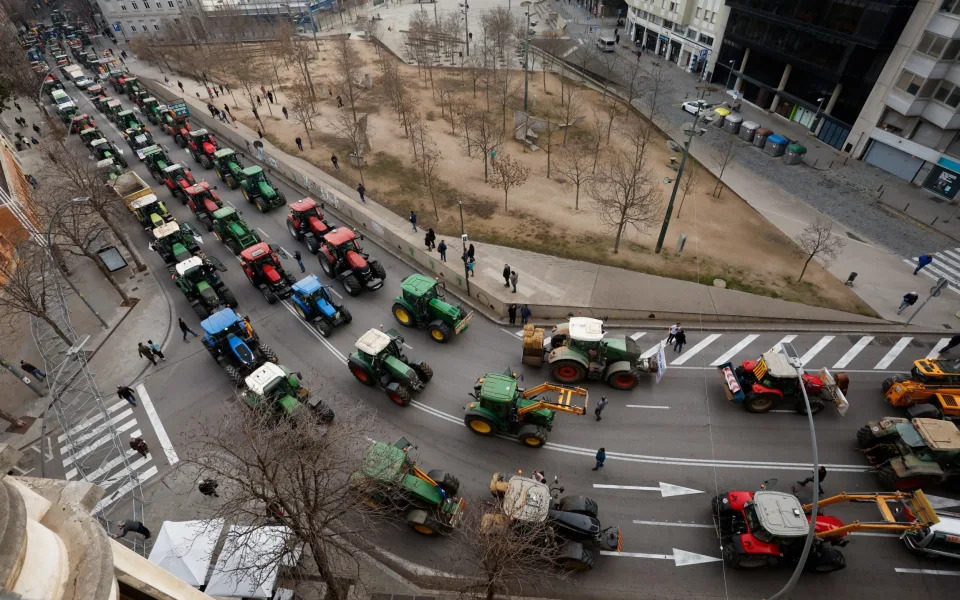
Europe has been rocked by continuing protests by farmers who have blocked key roads - REUTERS/Albert Gea
The European Union has caved in to angry protests from farmers and cut a target to slash agricultural emissions as part of the bloc’s net zero drive.
A demand to reduce nitrogen, methane and other emissions linked to farming by almost a third has been removed from a wider Brussels plan to cut greenhouse gas emissions by 90 per cent by 2040.
On Tuesday, Ursula von der Leyen, the European Commission president, also proposed withdrawing the EU’s plan to halve the use of pesticides, calling it a “symbol of polarisation”.
“Our farmers deserve to be listened to,” she told the European Parliament.
“I know that they are worried about the future of agriculture and their future as farmers. But they also know that agriculture needs to move to a more sustainable model of production so that their farms remain profitable in the years to come.”
A recommendation urging EU citizens to eat less meat was also removed from the plan.
The concessions came amid mounting demonstrations by farmers in Belgium, France, Germany and Italy ahead of this year’s EU elections.
Blockades on supermarket distribution centres have left shelves empty in Brussels, while several people have been injured in traffic accidents caused by farmers’ protests in the Netherlands, as they dumped rubbish and set fires on highways.
Organisers have threatened to continue disruption in the lead-up to the elections for the European Parliament in June.
Resistance growing
The ballot is seen as increasingly problematic for Mrs von der Leyen, and other mainstream politicians seeking re-election on a green agenda.
Resistance to the environmental overhaul has been steadily growing, including from the European People’s Party, the centre-Right political group to which commission president belongs.
The move to offer concessions to the farmers would be seen as a major step away from the bloc’s original green plans.
Agriculture was seen as “one of the core areas to reduce greenhouse gas emissions by 2040”, according to a draft European Commission plan, reported by the Financial Times.
The draft states that policies should now address the entire food sector rather than farming, which accounts for about 10 per cent of the EU’s emissions, “in isolation”.
The EU has pledged to be carbon neutral by 2050, with a first step of cutting emissions by 55 per cent compared with 1990 levels within six years.
Wopke Hoekstra, the EU’s Dutch climate commissioner, warned last month that the bloc had to ensure “our business stay competitive, there is a just transition”.
Eleven EU states, including France, Germany and Spain, have echoed that call in a letter to Brussels, urging a “fair and just transition” that should “leave no one behind, especially the most vulnerable citizens”.
The full plan to reduce emissions ahead of 2040 is to be announced later on Tuesday.
EU Withdraws Push to Cut Pesticide Use After Farmer Protests
Ellen Milligan and Lyubov Pronina
Tue, 6 February 2024
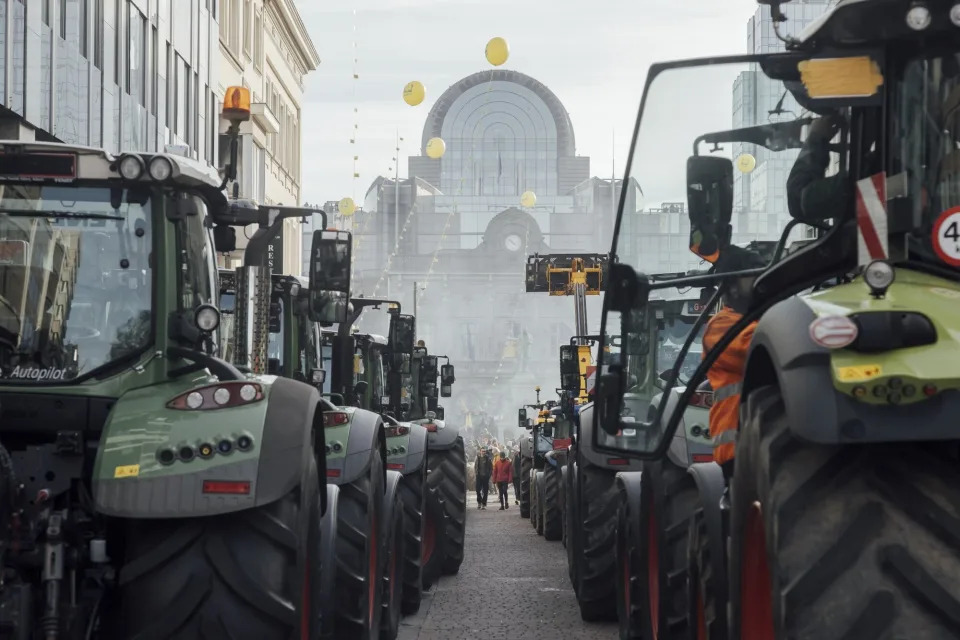
(Bloomberg) -- European Commission President Ursula von der Leyen said she will withdraw a plan to halve the use of pesticides because it became a “symbol of polarization” following protests by farmers across Europe.
The European Union’s executive arm in June 2022 proposed a regulation to slash pesticide use by 50% until 2030 as part of a plan to make farming more sustainable, but the European Parliament voted it down. Fears over falling crop yields and doubts over the ability of farmers to find substitutes and meet targets outweighed concerns about the environmental impact of pesticides.
“Only if we achieve our climate and environmental goals together, will farmers be able to continue to make a living,” von der Leyen said Tuesday during a European Parliament debate in Strasbourg.
The decision followed a wave of protests in France, Belgium and across Europe, with farmers arguing against proposed EU regulations, plans to cut subsidies and free trade deals with countries outside the bloc.
The French government had to promise farmers more financial support and a crackdown on unfair competition as well as tougher checks on the origin of products for them to suspend further blockades. Last week, the EU delayed plans requiring farmers to reserve more of their land fallow to improve biodiversity.
Farmers Bring Protests to Brussels as EU Leaders Meet Nearby
The bloc’s executive finds itself in a balancing act as it rolls out an ambitious climate roadmap on Tuesday to pursue a 90% net emissions reduction by 2040 that will require more sustainable consumer lifestyles and restrictions on businesses and agriculture.
The move to withdraw the pesticides plan is another example of the EU backtracking on legislation aimed at greening the bloc’s economy. The EU had to settle for a watered-down deal on a nature restoration law to return at least 20% of the bloc’s land and sea back to its original state.
The announcement on pesticides demonstrates the commission’s response to criticism as the EU is heading towards elections in June. Last month, von der Leyen kicked off a strategic dialog with the agricultural sector in an effort to placate farmers and show appreciation and respect.
Belgian Prime Minister Alexander De Croo, who during the protests had seen Brussels streets blocked and public monuments vandalized, welcomed the decision. “Crucial we keep our farmers on board,” De Croo wrote in a post on social media platform X.
In time, a new, more mature proposal on pesticides with more stakeholder involvement may be put forward, von der Leyen told the lawmakers, insisting that the discussion over reduced the use of the chemicals will continue.
Bloomberg Businessweek
EU scraps pesticide proposals in another concession to protesting farmers
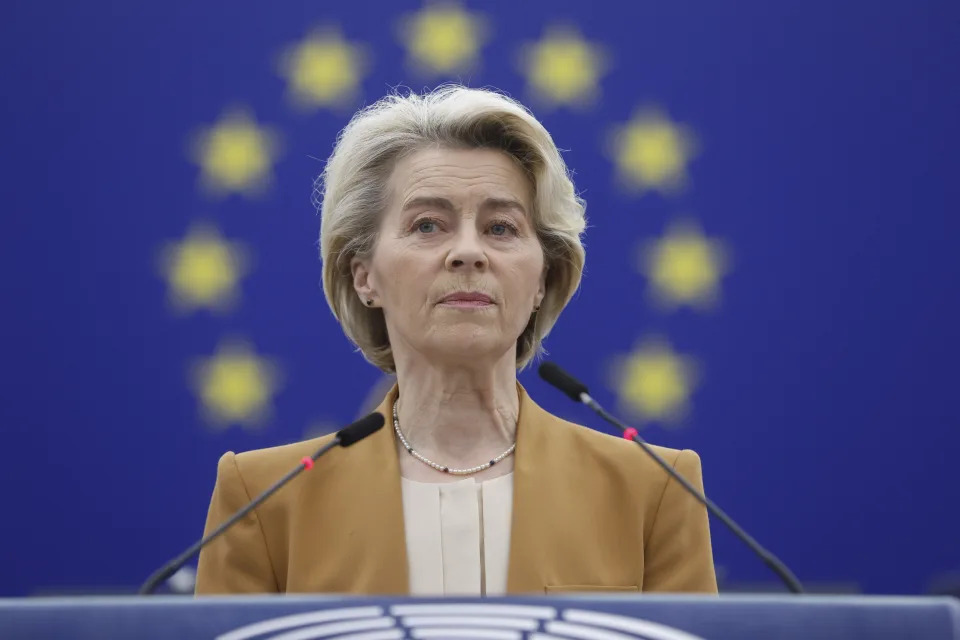
European Commission President Ursula von der Leyen delivers her speech at European Parliament in Strasbourg, eastern France, Tuesday, Feb. 6, 2024. The European Union’s executive shelved its anti-pesticides proposal Tuesday in yet another concession to farmers after weeks of protests blocked major capitals and economic lifelines across the 27-nation bloc.
(AP Photo/Jean-Francois Badias)
RAF CASERT
Updated Tue, 6 February 2024
BRUSSELS (AP) — The European Union’s executive arm shelved an anti-pesticides proposal Tuesday in yet another concession to farmers after weeks of protests blocked major capitals and economic lifelines across the 27-nation bloc.
Although the proposal had languished in EU institutions for the past two years, the move by European Commission President Ursula von der Leyen was the latest indication that the bloc is willing to sacrifice environmental priorities to keep the farming community on its side.
Farmers have insisted that measures like the one on pesticides would only increase bureaucratic burdens and keep them behind laptops instead of farming, adding to the price gap between their products and cheap imports produced by foreign farmers without similar burdens.
The pesticides “proposal has become a symbol of polarization,” von der Leyen told the European Parliament in Strasbourg, France. ”To move forward, more dialogue and a different approach is needed.”
She acknowledged that the proposals had been made over the heads of farmers.
“Farmers need a worthwhile business case for nature-enhancing measures. Perhaps we have not made that case convincingly,” von der Leyen said.
It is unclear when new proposals will be drafted. EU parliamentary elections are set for June, and the plight of farmers has become a focal point of campaigning, even pushing climate issues aside over the past weeks.
Under its much-hyped European Green Deal, the EU has targeted a 50% cut in the overall use of pesticides and other hazardous substances by 2030. The proposal was criticized both by environmentalists who claimed it would be insufficient to reach sustainability targets, and by agriculture groups who insisted it would be unworkable and drive farmers out of business.
The decision to shelve the proposal on pesticides represented the EU's latest act of political self-retribution in reaction to protests that have affected the daily lives tens of millions of EU citizens and cost businesses tens of millions of euros due to transportation delays.
Many politicians, especially on the right and its fringes, applauded the impact of the protests.
“Long live the farmers, whose tractors are forcing Europe to take back the nonsense imposed by multinationals and the left,’’ said Italy's right-wing transport minister, Matteo Salvini.
Last week, von der Leyen announced plans to shield farmers from cheaper products exported from wartime Ukraine and to allow farmers to use some land they had been required to keep fallow for environmental reasons.
The European Commission is set to announce more measures late Tuesday on how to reach its stringent targets to counter climate change. Environmentalists fear their could be more concessions there, too.
In France, where the protests gained critical mass, the government promised more than 400 million euros ($436 million) in additional financial support.
Meanwhile, protests continued in many EU nations.
Since early Tuesday morning, farmers across Spain have staged tractor protests, blocking highways and causing traffic jams to demand of changes in EU policies and funds and measures to combat production cost increases. The protests came as the Agriculture Ministry announced some 270 million euros in aid to 140,000 farmers to address drought conditions and problems caused by Russia’s war against Ukraine.
On Monday night, farmers in the Netherlands blocked several roads and highways with their tractors and torched hay bales and tires.
Police in the rural province of Gelderland said they took action against farmers blocking roads, but there were no immediate reports of arrests.
In recent weeks, farmers have protested from Poland to Greece, and from Ireland over Germany to Lithuania.
___
Mike Corder contributed from The Hague, Ciaran Giles from Madrid and Colleen Barry from Milan.
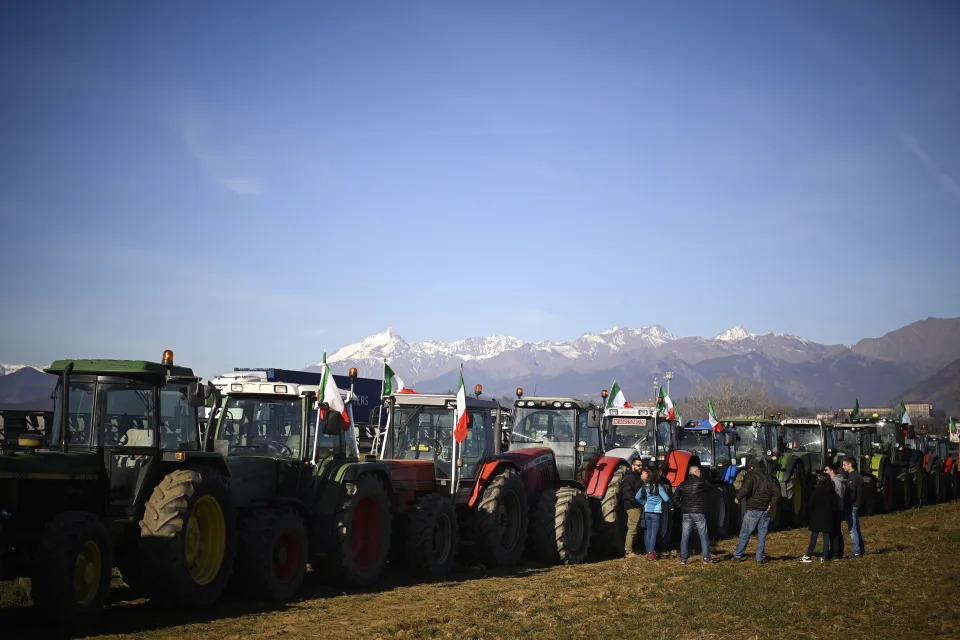
Italy Farmers Protest
Italian farmers protest against EU agricultural policies, near Turin, Italy, Monday Feb. 5, 2024.
(Fabio Ferrari/LaPresse via AP)
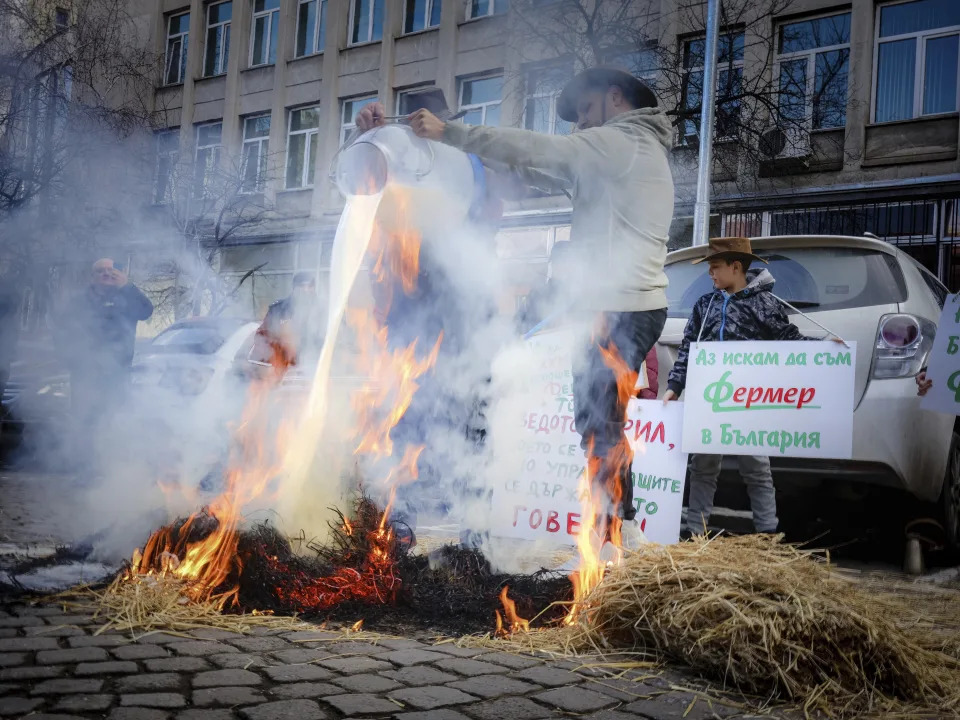
Bulgaria Farmers'Protest
Bulgarian farmers family pour milk on burning hay during farmers protest in front of the Agriculture Ministry in Sofia, Monday, Feb. 5, 2024. Hundreds of angry farmers took to the streets in Bulgaria's capital, Sofia, on Monday to complain of what they call "the total failure" of the government to meet the mounting challenges in the agricultural sector.

Bulgaria Farmers'Protest
Bulgarian farmers family pour milk on burning hay during farmers protest in front of the Agriculture Ministry in Sofia, Monday, Feb. 5, 2024. Hundreds of angry farmers took to the streets in Bulgaria's capital, Sofia, on Monday to complain of what they call "the total failure" of the government to meet the mounting challenges in the agricultural sector.
(AP Photo/Valentina Petrova)
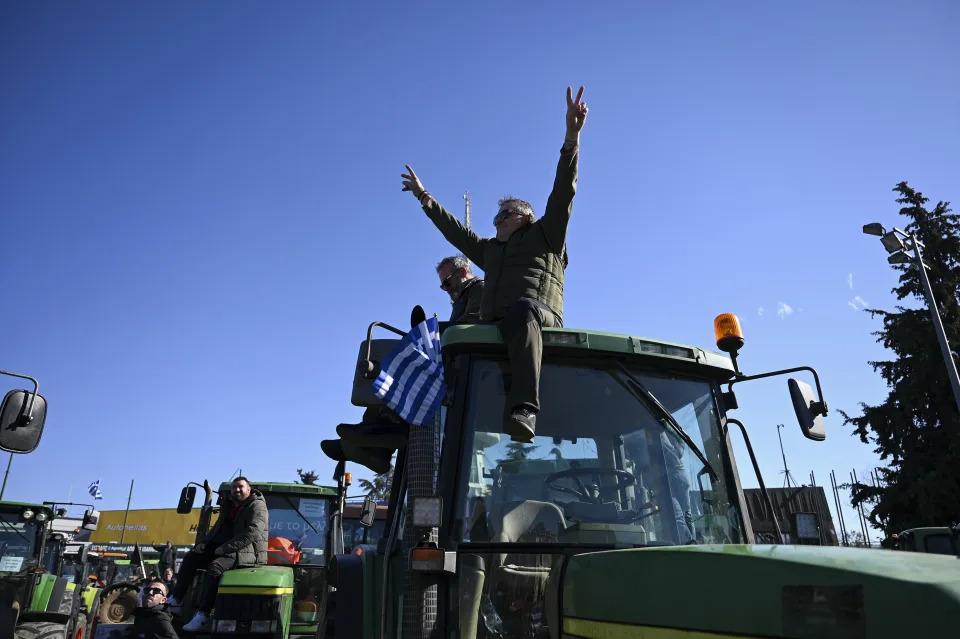
Greece Europe Farmers
Protesting farmers with their tractors take part in a rally outside the annual Agrotica trade fair in the port city of Thessaloniki, northern Greece, Saturday, Feb. 3, 2024. Greek farmers – hit by rising costs and crop damage caused by recent floods and wildfires – gathered around the conference center hosting the event in the northern city of Thessaloniki to underline their determination to escalate protests over rising production costs by blocking highways.

Greece Europe Farmers
Protesting farmers with their tractors take part in a rally outside the annual Agrotica trade fair in the port city of Thessaloniki, northern Greece, Saturday, Feb. 3, 2024. Greek farmers – hit by rising costs and crop damage caused by recent floods and wildfires – gathered around the conference center hosting the event in the northern city of Thessaloniki to underline their determination to escalate protests over rising production costs by blocking highways.
(AP Photo/Giannis Papanikos)
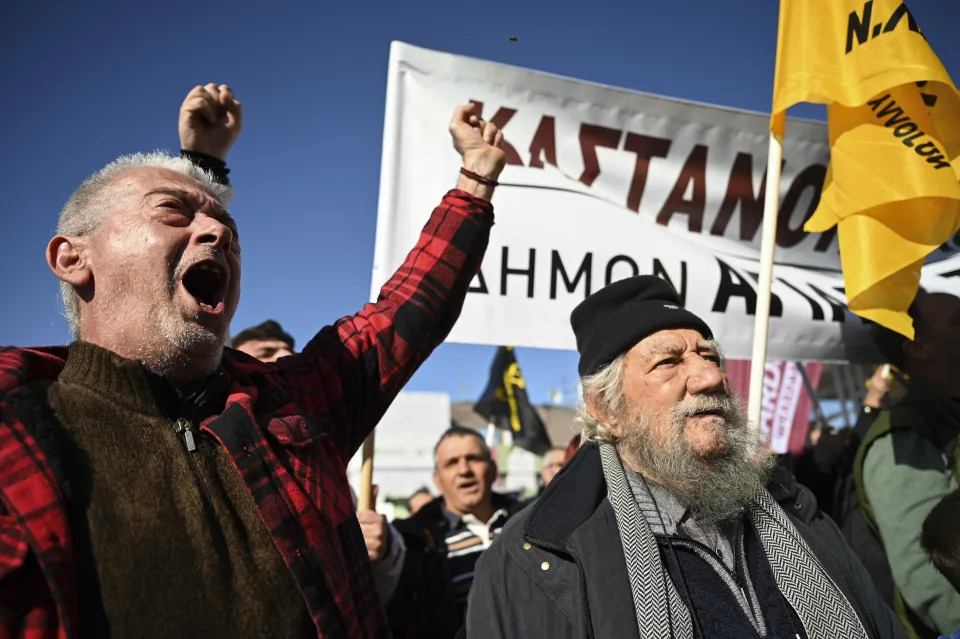
Greece Farmers
Protesting farmers shout slogans as they take part in a rally outside the annual Agrotica trade fair in the port city of Thessaloniki, northern Greece, Saturday, Feb. 3, 2024. Greek farmers – hit by rising costs and crop damage caused by recent floods and wildfires – gathered around the conference center hosting the event in the northern city of Thessaloniki to underline their determination to escalate protests over rising production costs by blocking highways
(AP Photo/Giannis Papanikos)
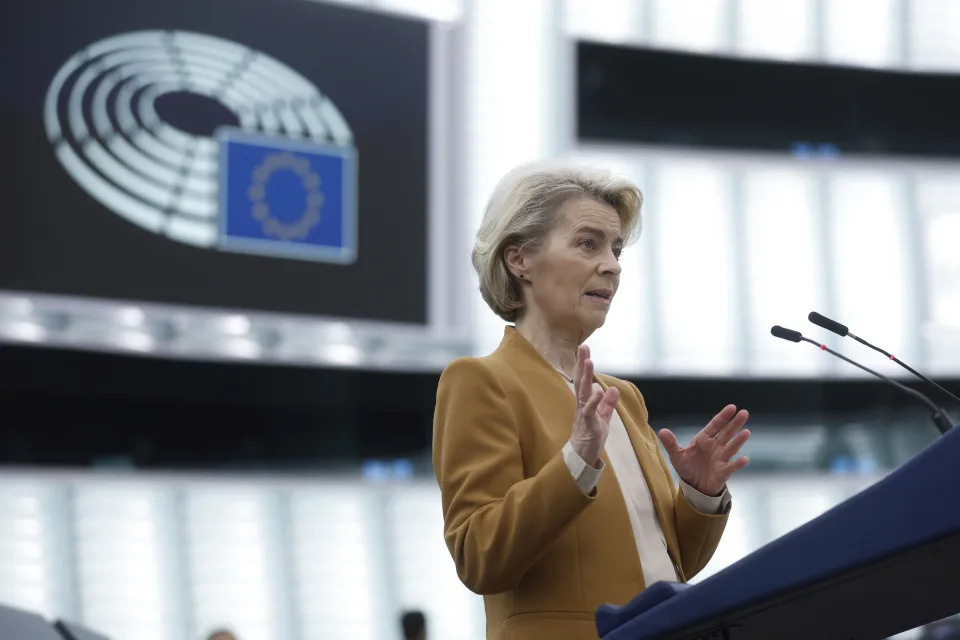
European Commission President Ursula von der Leyen delivers her speech at European Parliament in Strasbourg, eastern France, Tuesday, Feb. 6, 2024. The European Union’s executive shelved its anti-pesticides proposal Tuesday in yet another concession to farmers after weeks of protests blocked major capitals and economic lifelines across the 27-nation bloc.

European Commission President Ursula von der Leyen delivers her speech at European Parliament in Strasbourg, eastern France, Tuesday, Feb. 6, 2024. The European Union’s executive shelved its anti-pesticides proposal Tuesday in yet another concession to farmers after weeks of protests blocked major capitals and economic lifelines across the 27-nation bloc.
(AP Photo/Jean-Francois Badias)
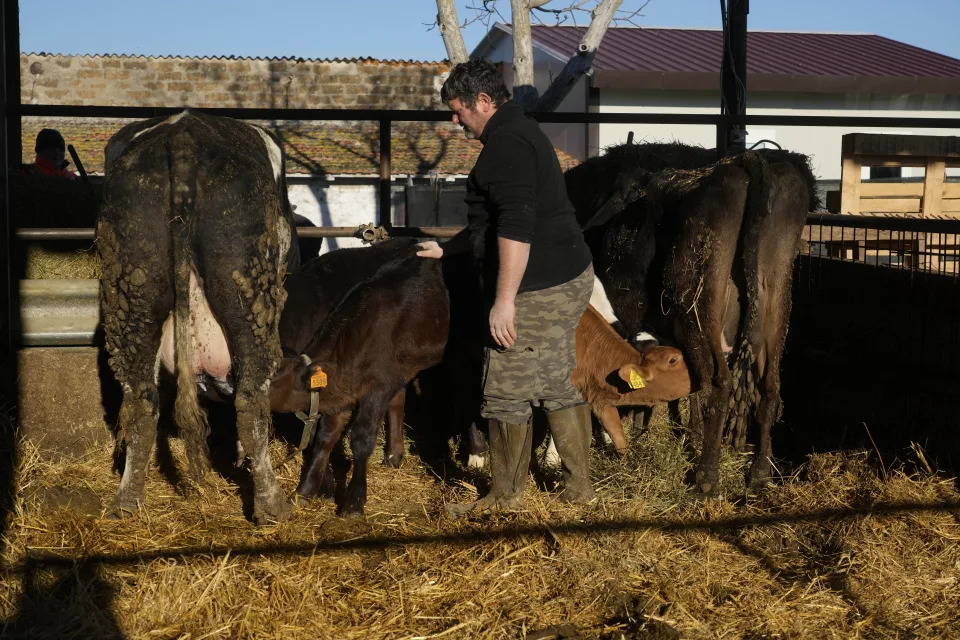
Italy Tractors Protest
Manuele Calzoni works at his farm before joining the protest of other farmers near the highway junction, in Orte, Italy, Saturday, Feb. 3, 2024. Farmers have been protesting in various parts of Italy and Europe against EU agriculture policies.

Italy Tractors Protest
Manuele Calzoni works at his farm before joining the protest of other farmers near the highway junction, in Orte, Italy, Saturday, Feb. 3, 2024. Farmers have been protesting in various parts of Italy and Europe against EU agriculture policies.
(AP Photo/Gregorio Borgia)
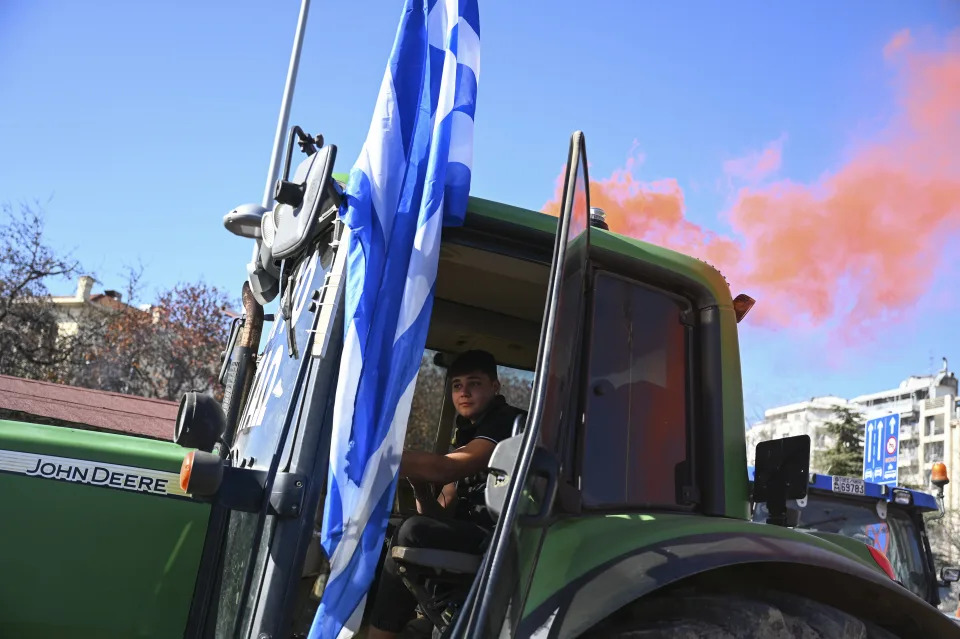
Greece Farmers
A farmer takes part in a rally outside the annual Agrotica trade fair in the port city of Thessaloniki, northern Greece, Saturday, Feb. 3, 2024. Greek farmers – hit by rising costs and crop damage caused by recent floods and wildfires – gathered around the conference center hosting the event in the northern city of Thessaloniki to underline their determination to escalate protests over rising production costs by blocking highways.

Greece Farmers
A farmer takes part in a rally outside the annual Agrotica trade fair in the port city of Thessaloniki, northern Greece, Saturday, Feb. 3, 2024. Greek farmers – hit by rising costs and crop damage caused by recent floods and wildfires – gathered around the conference center hosting the event in the northern city of Thessaloniki to underline their determination to escalate protests over rising production costs by blocking highways.
No comments:
Post a Comment